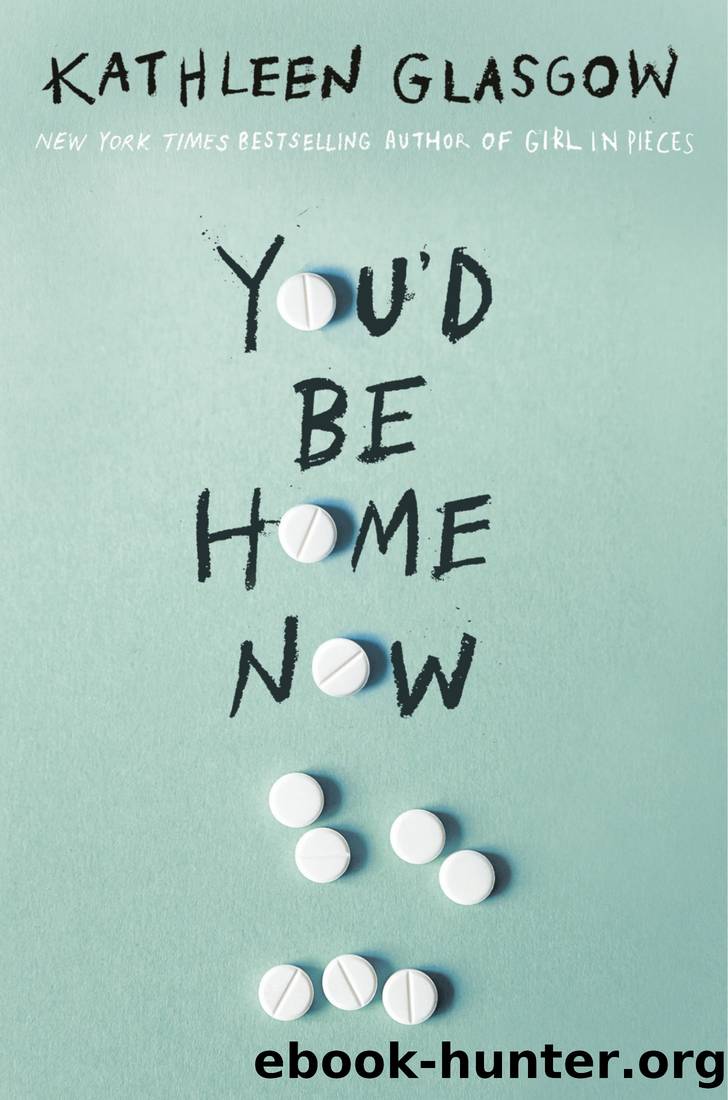You'd Be Home Now by Kathleen Glasgow

Author:Kathleen Glasgow [Glasgow, Kathleen]
Language: eng
Format: epub
ISBN: 9781786079695
Google: AO0pzgEACAAJ
Publisher: Oneworld Publications
Published: 2021-10-13T23:00:00+00:00
* * *
â
In Drama Club, Simon Stanley paces the stage with a giant piece of chalk. He talks about staging and blocking. âActors are like chess pieces on the stage. Wherever the director decides they need to be in a particular scene, itâs designed for maximum emotional effect.â He points to the ceiling and to the sides of the stage. âLighting helps, too. Lighting can highlight a particular moment. Itâs a subtle signal to the audience that something is important, an emotion is heightened, things are changing, or ending. Make sense?â
Everyone nods.
âA role is the part you play in a production. Characters are the moving parts to keep the story evolving, keep all your chess pieces in play, keep the emotions alive. Actors for the stage learn how to use their presence, their voice, their physicality, to convey the meaning of the story. The play. âThe playâs the thing,â as weâve all heard.â
Simon marks an X in the middle of the stage. âYou,â he says, pointing to me. âStand here, please.â
âWhat?â The blood drains from my face. Everyone is looking at me. Lucy Kerr whispers to the girl next to her and glares at me.
Jeremy nudges my shoulder with his. âGo on,â he whispers.
Simon points to Priscilla. âPris, you go out into the seats, the middle row.â
Priscilla jumps off the stage, lean and lithe as a colt, and runs to a seat. I look beyond her to the seats in the back, where Joey usually sits if he doesnât have tutoring. I wish he was here now. That might make me less nervous.
Simon says, âCome now, Emory, dear. The lovely thing about theater is that we simply have no time for shyness. The audience canât wait forever.â He smiles gently.
I walk hesitantly to the X, all eyes on me.
âNow, repeat after me,â Simon says.
âFor sweetest things turn sourest by their deeds;
Lilies that fester smell far worse than weeds.â
I repeat it, but softly.
âNow, what do you think that means?â Simon asks.
I blink. Sweet, getting sour by something done, or something someone has done? Beautiful things that die are worse than ugly things we expect to die?
I say that, but quietly. Simon says, âWrong! Just kidding. Maybe. Maybe thatâs your interpretation of it. Thatâs fine. You have to try to interpret your characterâs emotions and motivations from what the playwright has given you on the page, and from what the director asks you to do. Bring them to life. Now, who is speaking?â
âA girl?â
âOkay, thatâs a good start. Where is she?â
I imagine a girl walking in a field of flowers.
âIn a field of flowers?â
âOkay. We can start there. Do you think sheâs sad, wistful, mad?â
âShe soundsâ¦maybe wistful, like sheâs sad that lilies die. I donât know, this is a weird quote.â
âShakespearean sonnet, child. Nothing weird about that. If we donât have the Bard, we donât have half of our language. Now, your character is a wistful girl in a field of flowers. Let the audience know that. Start by thinking about whom she might be talking to.
Download
This site does not store any files on its server. We only index and link to content provided by other sites. Please contact the content providers to delete copyright contents if any and email us, we'll remove relevant links or contents immediately.
The Girls I've Been by Tess Sharpe(979)
Firekeeper's Daughter by Angeline Boulley(930)
I Think I Love You by Auriane Desombre(910)
21st Birthday (Women's Murder Club) by James Patterson(908)
Harry Potter and the Sorcerer's Stone by Rowling J K(886)
Harry Potter 01 - Harry Potter and the Sorcerer's Stone by J.K. Rowling(833)
Let's Talk About Hard Things by Anna Sale(753)
Perfect Illusion by Claudia Tan(704)
The Lion King by Disney Book Group(678)
You Are Awesome by Neil Pasricha(618)
Flamefall by Rosaria Munda(598)
A Pho Love Story by Loan Le(574)
The Montessori Baby by Simone Davies(565)
Time To Go by Time To Go (epub)(546)
Yolk by Mary H. K. Choi(512)
The Project by Courtney Summers(478)
Sandwiches! by Alison Deering(475)
The Sky Above Us by Natalie Lund(471)
You'd Be Home Now by Kathleen Glasgow(466)
